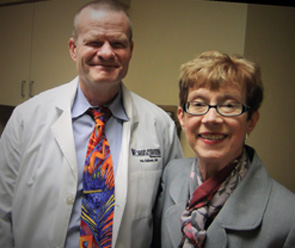
“Mom, we’d love it if you and Dad moved closer to us,” my daughter, Laura, said.
Move from Wisconsin to Texas? The idea sounded tempting to me because my grandchildren, ages 2 and 5, were growing up over 1,000 miles from us, and we saw them only once or twice a year. Plus, winters in Wisconsin had been more brutal every year with 35º below zero temperatures with wind chill and slippery, dangerous conditions. After much thought and consideration, we decided to leave the only state we had ever lived in and move cross country to Texas.
There were many details to work out. Because I have lived with rheumatoid arthritis (RA) for 37 years, successfully moving cross country was an even greater challenge than it would otherwise have been. Here are some practical suggestions to share with your patients if they plan to move cross country, or even across town.
Plan to Have Extra Amounts of Every Medication Needed
My RA has been successfully managed by effective medication. Prior to leaving Wisconsin, I filled each prescription as close to our moving date as possible to allow for a two- or three-month supply until I could establish care with my new Texas rheumatologist, Nils Erikson, MD.
I scheduled a new patient appointment with Dr. Erikson to establish care as soon as we arrived in Longview, Texas. I wanted to make sure he would order my teriparatide, etanercept, methotrexate, folic acid and dapsone at my initial appointment.
Of course, the teriparatide and etanercept required prior authorizations by my new Texas insurance company, which delayed obtaining the medication. I needed to make numerous (but polite) phone calls to facilitate the prior authorizations. I managed to receive my teriparatide pen on the exact day I needed to start it—just in time!
Unfortunately, almost every RA patient needs to jump through the hoops of their insurance company at some point to get the medications they need.

Provide a Comprehensive Health History to Your New Physicians
More than any other specialist, an RA patient’s rheumatologist plays the most important role in helping them to live with this serious illness. They need to understand exactly how RA is affecting the daily life of their patient, both physically and emotionally, and how to best manage the symptoms.
Moving cross country meant leaving my Wisconsin rheumatologist, Eric Gowing, MD, who had done an outstanding job of managing my RA, urticarial vasculitis, osteoporosis and Felty syndrome.
We dealt with my flare-ups of pain, stiffness, fatigue, vasculitis rash, low absolute neutrophil count and anemia as a team. Leaving such a fine physician and friend was a very difficult and frightening thing to do!
Dr. Erikson, who has bravely taken me on as his new Texas patient, told me, “Often, when I see a patient with such a complicated history as you have, I am given nothing to go on. But this time, Dr. Gowing provided a very thorough history and summary of your care for me to review. This is great!”
At the request of my new Texas internal medicine physician, I brought records of my last office visit with each of my Wisconsin doctors for her to refer to. This has been a great help to her, also.

Remember to Take Care of Yourself During This Stressful Time
Moving cross country brings with it a lot of stress. Stress has the potential to cause a flare-up of RA symptoms, so this is an opportune time to manage it both physically and emotionally.
My emotional state has a tremendous impact on how well I feel. The moving van arrived eight days after we did, not as quickly we had hoped for. The pest control man arrived over an hour late and never called. A 90-day supply of the wrong generic brand of ropinirole was sent by my new mail-order pharmacy because of an error when it was ordered. Our Internet connection did not go smoothly, and my daughter spent hours fixing it. Towers of boxes needed unpacking.
I needed to remember that many of these frustrations were out of my control. I could only control my reaction to them and take better care of myself. I started by pacing my activities. Not every box needed to be unpacked the first week.
Music brings me tremendous joy and peace. I auditioned for the East Texas Symphonic Band and was accepted into the euphonium (baritone horn) section. Focusing on music brought down my stress level. We performed our first concert of the season, and it was a thrill to perform on stage. I am “the older lady in 5th chair.”
We have been caring for Kate, our granddaughter. Even on days when I feel more stiff and fatigued, Kate is a cute distraction, so I forget how I feel. My grandson, Matthew, says, “Grandma is slow, but I love her anyway.” I am the “art grandma” and not the one who sits on the floor, but that is just fine with him. Children are very accepting of deformed fingers and a grandma who cannot open colored markers.

I volunteered to be a guest lecturer for the School of Nursing at LeTourneau University in Longview.
I was able to share my knowledge of osteoarthritis and osteoporosis in the Geriatric Nursing class and plan to speak about RA and fibromyalgia in the Medical Surgical Nursing class in spring. Sharing my love for nursing with the students took the focus off myself—yet another positive way to manage stress.
In closing, moving cross country is exciting yet challenging for the RA patient. These strategies helped me to accomplish this major life event and transition from a “cheesehead” to a Texan.
Sarah Troxell, RN, BSN, was the RN educator and case manager for the Coordinated Rheumatology and Pain Management Programs at Mercy Medical Center in Oshkosh, Wis., until her retirement. She is an emeritus member of the ARHP. She now resides in Longview, Texas.


